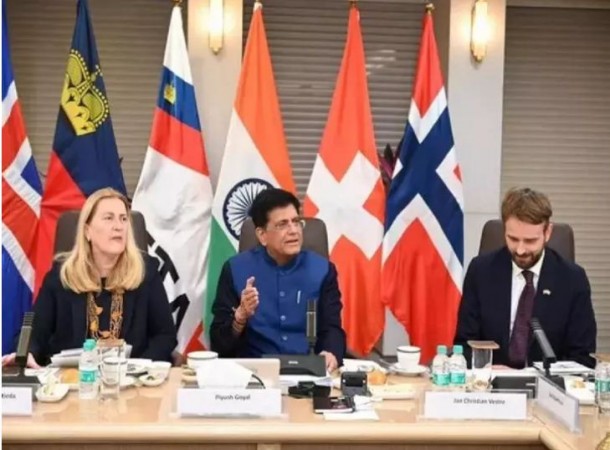
Indians are in for a treat as a groundbreaking agreement between India and the European Free Trade Association (EFTA) promises to slash prices on a variety of goods, including Swiss watches, chocolates, and more. The deal, signed on Sunday, secures a massive $100 billion investment commitment over the next 15 years from EFTA nations, aiming to generate one million jobs in India.
After nearly 16 years of negotiations, the agreement with EFTA was finally sealed. Talks, initiated in 2008 but halted in November 2013, resumed in October 2016 and concluded after 21 rounds. This pact marks a historic milestone as it legally binds target-oriented investments and job creation, a first in the realm of free trade agreements.
For those unfamiliar, the European Free Trade Association comprises Iceland, Liechtenstein, Norway, and Switzerland.
What Does the $100 Billion EFTA Deal Entail?
With the $100 billion pact, India will gradually eliminate basic customs duties on Swiss chocolates, wristwatches, and pocket watches over a seven-year period. Presently, import duties stand at 30 percent for chocolates and 20 percent for most Swiss watch variants.
Once all parties complete the ratification process, the agreement will come into effect.
Switzerland Emerges as India's Leading Trade Partner within EFTA
In the fiscal year 2022–2023, trade between India and the four EFTA countries amounted to $18.66 billion, with Switzerland and Norway leading the charge. India primarily exports drugs, pharmaceuticals, jewelry, gems, and chemicals to EFTA nations, while importing gold, watches, pharmaceuticals, ships, and boats.
Switzerland stands out as India's primary EFTA trading partner, accounting for 91% of bilateral merchandise trade, according to estimates. Additionally, India has extended discounts on Swiss wines priced between $5 and $15 CIF over a decade, with duties gradually reducing for wines priced higher.
Which Items Will Witness Price Reductions for Indians?
The EFTA deal encompasses tariff concessions on various Swiss imports, including seafood, Mediterranean fruits, coffee, oils, sweets, processed foods, and wine, among others. Consequently, Indian consumers can expect these products to become more affordable and accessible in local markets.
The agreement extends duty-free access to nearly all domestic industrial goods in EFTA nations, along with duty concessions on processed agricultural products. Notably, Switzerland has already abolished tariffs on most industrial goods since January 1.
"The effective duty on gold remains untouched. Sensitivity related to Production Linked Incentive (PLI) in sectors such as pharma, medical devices, and processed food, etc., have been taken into account while extending offers. Sectors such as dairy, soya, coal, and sensitive agricultural products are kept in the exclusion list," the Indian government stated on March 10.
EFTA's market-access offer encompasses all non-agricultural products and tariff concessions on processed agricultural products. India has proposed 105 sub-sectors to EFTA and secured commitments in 128 sub-sectors from Switzerland, 114 from Norway, 107 from Liechtenstein, and 110 from Iceland, as per official statements.